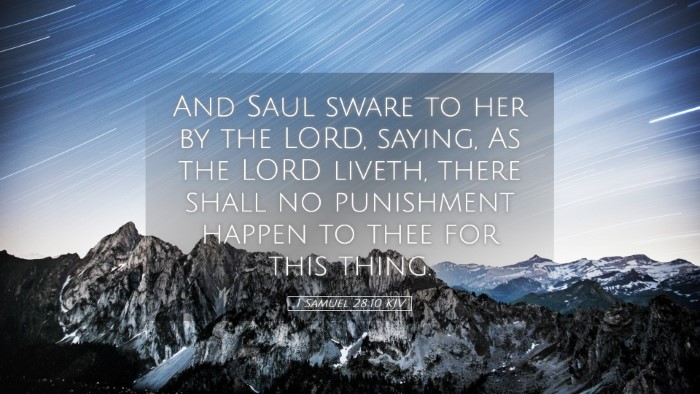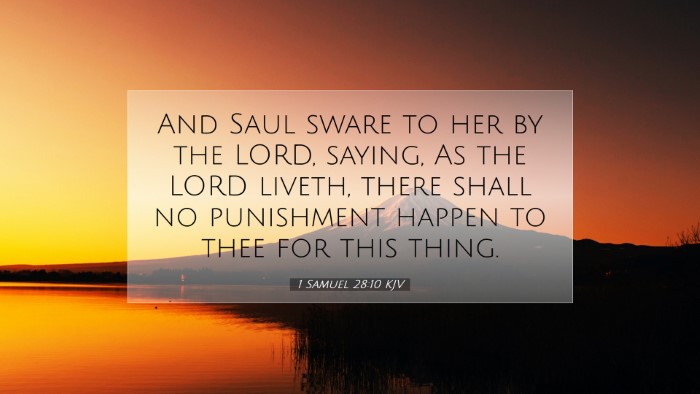Commentary on 1 Samuel 28:10
Bible Verse: “And Saul swore to her by the LORD, saying, As the LORD liveth, there shall no punishment happen to thee for this thing.”
Contextual Overview
This verse occurs during a critical juncture in the life of King Saul, who finds himself in a desperate situation. The Philistine army is preparing for battle, and Saul feels abandoned by God, with no prophetic guidance or dreams to lead him. Seeking counsel, he resorts to the forbidden practice of necromancy by consulting the witch of Endor, a decision fraught with moral and spiritual implications.
Theological Implications
This incident captures the complexities of Saul's character and his tragic downfall. The act of swearing by the LORD while simultaneously committing an act that the Lord had expressly forbidden highlights the contradictions in Saul’s life.
Saul's Desperation
Saul's desperation leads him to contradict his own previous edicts against witches and mediums, showing how fear can drive individuals to make unwise decisions. This aligns with Matthew Henry's observations on the moral decline of Saul, as he shifts from being a king once chosen by God to a man grasping at straws in the face of divine silence.
Nature of Oaths
Saul's oath here is significant. He swears by the very God he has consistently disobeyed. Albert Barnes emphasizes that swearing by the Lord should always carry the weight of truth and integrity, yet in Saul's case, it is marred by hypocrisy. This oath demonstrates the precarious relationship between the sacred and the profane in the actions of human beings.
God's Silence
Saul's disconnection from God is a pivotal theme in this narrative. Adam Clarke points out that God's silence is both judgment and consequence of Saul's repeated disobedience. Instead of seeking reconciliation, Saul chooses to consult the dead, demonstrating a lack of faith and a desperate clinging to sinful alternatives.
Historical Context
The practices of necromancy and witchcraft were strictly prohibited in the Mosaic Law (Leviticus 20:27). Saul’s contradiction not only shows his moral failure but also his departure from the covenantal faith that was foundational to Israel’s identity. This highlights how even a king, anointed by God, can fall into gross sin when separated from divine guidance.
Character Analysis: Saul
Saul's character serves as a warning for leaders and individuals alike. His initial humility and promise are overshadowed by fear and insecurity. Matthew Henry notes that although Saul began with great potential, his gradual disobedience led to a consistent decline in moral integrity.
Leadership Lessons
- Fear can corrupt judgment: Saul’s fear of the Philistines led him away from God’s wisdom.
- Integrity in leadership: Swearing an oath does not absolve one from moral responsibility.
- Spiritual depravity: Saul’s choice reflects a deeper spiritual depravity when one turns to the forbidden in times of crisis.
Interpretive Warnings
This verse serves as an admonition against seeking guidance from worldly or forbidden sources during times of uncertainty. The Lord desires that His followers seek Him above all else, and forsaking this divine pursuit, as Saul did, results in profound consequences.
Contemporary Application
In modern contexts, believers may find themselves in situations akin to Saul’s, feeling estranged from God and seeking answers from secular or misleading sources. The importance of maintaining one’s spiritual integrity and faith in divine guidance stands out. Adam Clarke remarks that believers must learn to trust God even when His voice seems silent.
Conclusion
1 Samuel 28:10 is not merely a historical account but a theological rich narrative that illustrates the tragedy of choosing disobedience over faith. Saul's situation compels contemporary readers to reflect on their own adherence to God’s directives and warn against the peril of forsaking divine counsel in desperate times.
As you meditate on this passage, consider the avenues through which you seek guidance. Are there 'witches' of modernity that lure you away from the will of God? Return to the steadfast commands of the Lord, who desires your trust and devotion above all.


